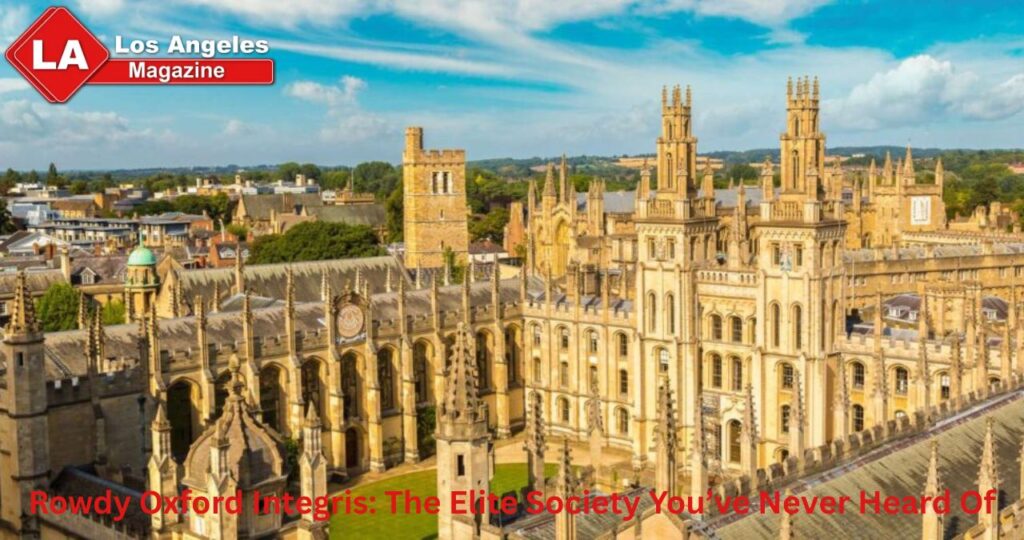In the annals of secret societies and exclusive clubs, names like Skull and Bones, The Bullingdon Club, and Bohemian Grove frequently surface in hushed conversations and conspiracy theories. But there’s one name that’s been steadily whispered in elite circles, one with a reputation for intellect, influence, and unorthodox traditions — Rowdy Oxford Integris.
While few outside certain prestigious universities and old-money families have ever encountered this enigmatic organization, its influence, history, and mythos have made it a subject of fascination for historians, journalists, and internet sleuths alike. Today, we unravel the curious story of Rowdy Oxford Integris, the secretive society that’s remained largely out of public view — until now.
The Origins of Rowdy Oxford Integris
The precise founding date of Rowdy Oxford Integris is elusive, but historians trace its earliest mentions to the mid-19th century, during the intellectually turbulent years at the University of Oxford. Rumor has it that the society was established by a faction of rebellious scholars and young aristocrats who found themselves disillusioned with the rigid traditions of established Oxford institutions.
The group’s name, “Rowdy Oxford Integris,” reportedly reflects its ethos: Rowdy for its unorthodox, boisterous gatherings; Oxford for its academic roots; and Integris, derived from Latin, meaning “whole” or “uncompromised,” symbolizing the group’s pursuit of intellectual freedom and absolute authenticity.
The Purpose and Philosophy
Unlike other secret societies driven by politics, wealth, or religious influence, Rowdy Oxford Integris was said to be centered around the ideas of intellectual rebellion, candid debate, and social experimentation. Members sought to challenge conventional wisdom, dismantle societal norms, and embrace a raw, unapologetic form of scholarship and camaraderie.
Their philosophy, known internally as The Doctrine of Integritas, emphasized:
- Unfiltered Debate: Members were encouraged to voice their most controversial or radical ideas without fear of ostracism.
- Complete Anonymity Outside the Circle: Discussions and rituals were strictly confidential, with members sworn to secrecy.
- Cultural and Intellectual Subversion: Challenging social hierarchies, academic traditions, and established authorities was seen as not only acceptable but essential.
- Pursuit of Wholeness: Members sought balance between reason, emotion, tradition, and rebellion — a complete integration of the self.
Membership and Selection Process
Entry into Rowdy Oxford Integris has long been shrouded in mystery. Unlike other societies that rely on legacy admissions or public displays of wealth and influence, this society is rumored to select members through anonymous challenges and intellectual duels.
Invitations, known as The Crimson Summons, reportedly appear in the form of a cryptic handwritten letter, delivered anonymously to students or young professionals considered “sufficiently rowdy and integris” in character. The selection process tests one’s capacity for intellectual bravery, wit, and moral flexibility.
Successful candidates are invited to The Hall of Mirrors, a clandestine meeting location where they undergo a night of initiation debates, psychological games, and philosophical challenges designed to strip away social personas.
Notable Alleged Members
Though no living member has ever publicly confirmed their affiliation with Rowdy Oxford Integris, historical records and speculative biographies suggest that several influential writers, political figures, and innovators may have passed through its ranks.
Names speculated to have ties to the society include:
- Oscar Wilde: Known for his wit and defiance of Victorian norms, Wilde’s rebellious spirit aligns with Integris principles.
- T.E. Lawrence (Lawrence of Arabia): His unconventional military strategies and disregard for colonial authority fit the Integris mold.
- Virginia Woolf: Though less publicly rowdy, Woolf’s radical literary contributions and critiques of social conventions hint at possible involvement.
In recent decades, unconfirmed rumors have pointed to tech entrepreneurs, avant-garde artists, and political disruptors as modern members.
The Integris Symbols and Traditions
The society’s crest, described in fragments of old letters and engravings, features a shattered mirror surrounded by intertwined laurel leaves and a motto: “In Integritate, Lux.” (In wholeness, light.)
Known traditions include:
- The Midnight Symposium: An annual debate held under open skies where members discuss taboo topics.
- The Oath of Mirrors: New members stand before a circle of mirrors to confront their reflections and recite the society’s code.
- The Integris Challenge: A rite where members must publicly uphold an unpopular truth or challenge an academic authority figure in their field.
These rituals are said to be both physically and mentally grueling, designed to test resolve, integrity, and intellectual audacity.
Modern-Day Rowdy Oxford Integris
While much of the lore surrounding Rowdy Oxford Integris remains steeped in secrecy, there are signs that the society continues to thrive in modern forms. With universities embracing digital platforms and anonymous forums, it’s believed that the society has adapted its methods, holding virtual debates and encrypted gatherings.
Some believe that Rowdy Oxford Integris now operates as a global network of intellectual subversives — thinkers, artists, and activists who use their positions in academia, media, and politics to challenge conformity and provoke deeper reflection in society.
Mentions of Integris-influenced art installations, whistleblowing projects, and radical think tanks have surfaced in recent years, suggesting that the society’s rebellious spirit remains alive.
Why Rowdy Oxford Integris Still Matters
In a world increasingly driven by conformity, digital surveillance, and algorithmic echo chambers, the concept of a society dedicated to unfiltered debate, intellectual courage, and challenging authority holds a unique appeal.
The mythos of Rowdy Oxford Integris reminds us of the importance of questioning dominant narratives, embracing uncomfortable truths, and preserving spaces for radical thought. Whether fact, fiction, or a blend of both, the legend endures as a symbol of integrity, rebellion, and fearless inquiry.
Final Thoughts
Rowdy Oxford Integris stands as a testament to the enduring allure of mystery, intellectual rebellion, and exclusive societies that defy conventional norms. Its history, whether fully factual or partially mythologized, offers a fascinating window into humanity’s craving for secret knowledge, belonging, and the pursuit of unfiltered truth.
For now, it remains an enigma — a society of the bold, the rowdy, and the integris, quietly shaping conversations behind closed doors and in the shadows of history.



